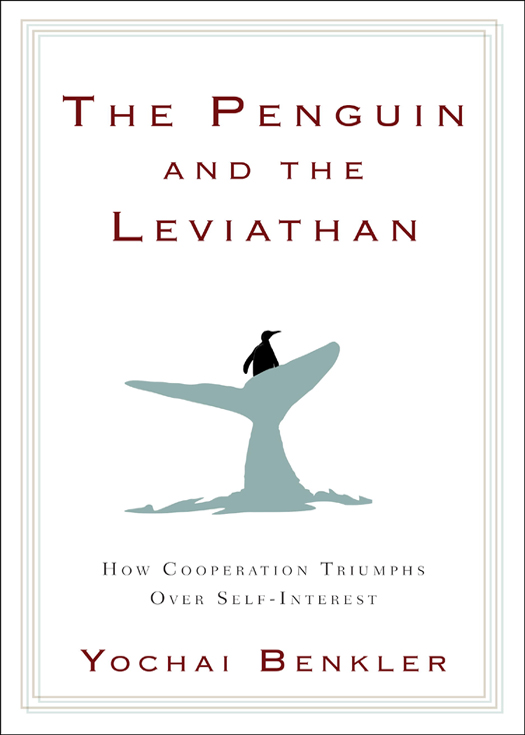
The Penguin and the Leviathan
How Cooperation Triumphs over Self-Interest
کتاب های مرتبط
- اطلاعات
- نقد و بررسی
- دیدگاه کاربران
نقد و بررسی

June 6, 2011
For the last several centuries, many of our deeply held beliefs have been shaped by the view that human beings are fundamentally motivated by self-interest. In his latest work, Benkler (The Wealth of Networks) challenges this long-held view, asserting that the spirit of human cooperation is stronger than selfishness a view that will likely revolutionize business, economics, technology, government, and human interaction in the future. To make his point, Benkler draws on the philosophy of 17th-century scholar Thomas Hobbes, whose seminal book, Leviathan, used the metaphor of the Leviathan, a monstrous biblical sea creature, for his image of a strong sovereign power protecting a selfishly motivated society. In today's world, however, says Benkler, there is considerable evidence that self-interest and the failure of Leviathan-like governments have actually led to the collapse of our economic systems. Instead, he asserts, individuals are more likely than ever to act altruistically and actually prefer a culture of collaboration. Benkler maintains that we already see the rise a new cooperative economic structure, and he cites as evidence the explosion of social media, open source software, and new business models like Zipcar or the NUMMI (New United Motor Manufacturing Inc.) joint venture between General Motors and Toyota. While Benkler has a distinctly academic point of view, his voice and tone are conversational, and his pertinent examples bring his ideas to life.

August 1, 2011
A Harvard professor offers an alternative to the dog-eat-dog, winner-take-all system of governance that dominates American culture.
Successfully employed organizational models eschewing "carrot and stick" incentives for more cooperative efforts have succeeded in everything from resuscitating failed automobile plants to putting President Barack Obama in the White House. Benkler (The Wealth of Networks: How Social Production Transforms Markets and Freedom, 2007, etc.) even argues—much like an evolutionary psychologist—that cooperation is hardwired into human DNA. The author closely examines the very nature of cooperation in a clearly enthusiastic yet scholarly tone. Far from a panacea, cooperation does entail risks, and Benkler doesn't shy away from any of them. That demonstration of intellectual honesty gives weight to his argument: There is something better than the outdated, top-down system of governance to which so many still cling. Readers hopscotch through Zipcar, Magnatune, Southwest Airlines, the NUMMI automobile plant in California and other boardrooms where the changeover from compliance to cooperation has translated into cash. The "triumph" indicated by the book's subtitle is somewhat muted, however, because readers are never left in any one place long enough to gain a palpable sense of the cooperative philosophy in action. Nonetheless, Benkler provides a solid swipe at blind adherence to "free market" dogma.
Comprehensive and provocative.
(COPYRIGHT (2011) KIRKUS REVIEWS/NIELSEN BUSINESS MEDIA, INC. ALL RIGHTS RESERVED.)

























دیدگاه کاربران